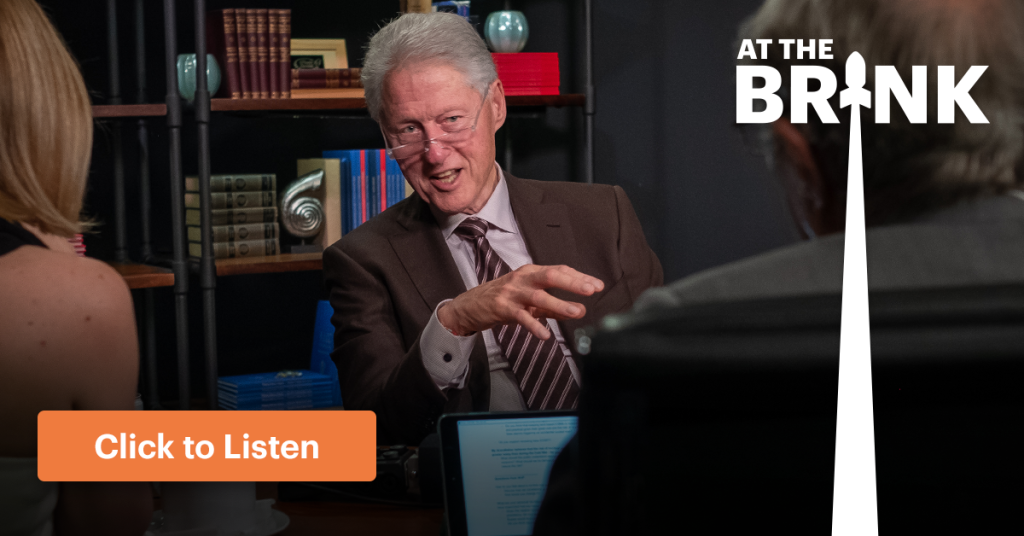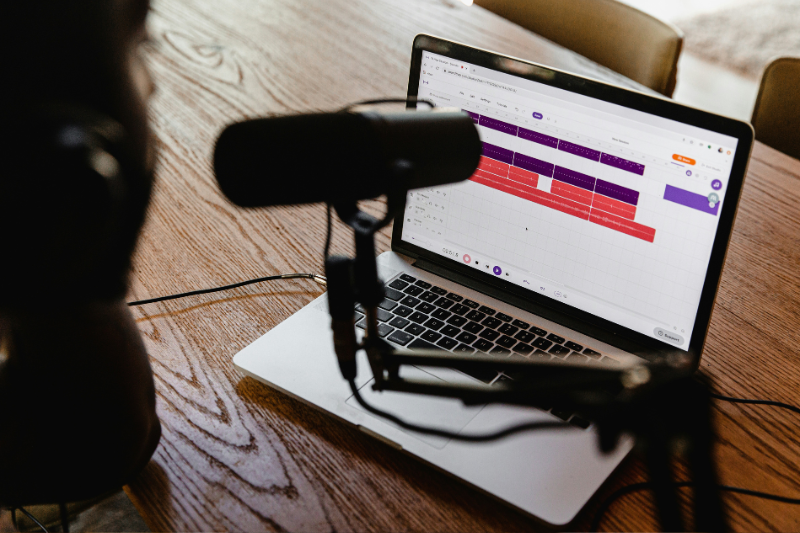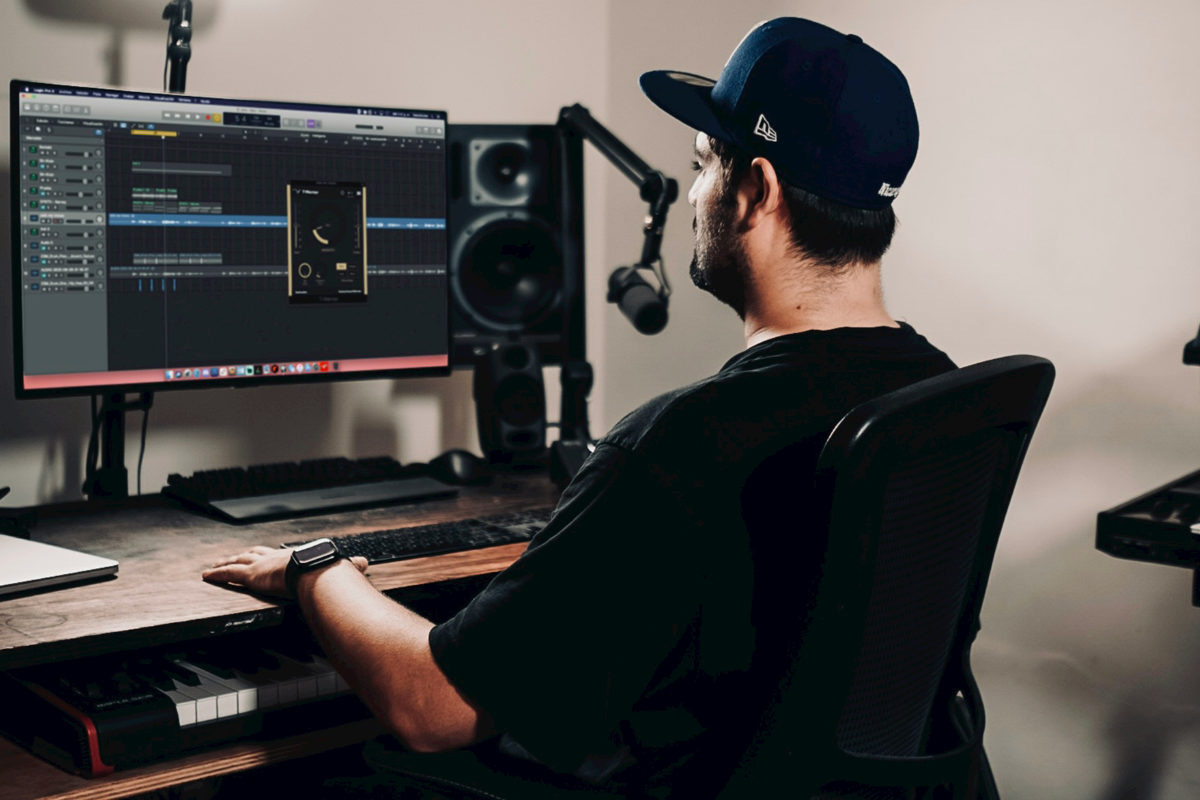How long does it actually take to run a company podcast?
And I don’t mean an amateur personal show. I mean something that creates real value in the marketplace and that engages your ideal customers. A proper company podcast that drives awareness, relationships, and leads.
In this article, I’ll explain how long it takes to produce different types of shows and the 12 things you should consider outsourcing.
And for the sake of this article, let’s assume your show has already launched. The considerations and time it takes to plan a new podcast can easily be an article on its own. If you are in the planning phase, make sure to avoid the 6 common pitfalls of the podcast planning process.
To begin, let’s look at the time it takes to run interview, narrative, and dynamic podcasts.
How much time does it take to put together an interview podcast?
The time it takes to produce an interview podcast will vary depending on your level of quality and intentionality.
For example, identifying, researching, and scheduling your guest will probably take 30 minutes to 2 hours depending on how much planning you like to do. And conducting most interviews takes 30 minutes to 1.5 hours, depending on your episode length.
Things get a little wild when it comes to editing.
Some people don’t edit. They just record and publish. I think that’s a disservice to yourself, your company’s brand, and your audience.
Some people click a button and have AI tools, like Cleanvoice and Descript, edit the episodes for them automatically. This takes some time to process, and it’s usually better than not editing at all. However, AI isn’t foolproof, and you should set time aside to review each episode regardless of using AI.
Finally, you could manually edit your episode. When doing it this way, I like to plan on 2.5 to 3x the length of the original audio. So, if you had an hour-long interview, plan on 2.5 to 3 hours of manual editing.
For me, the answer is somewhere between leveraging AI tools to do simple tasks and having a human spend time making creative calls and final reviews.
Most standard podcast interview episodes will take approximately 5 hours to put together from beginning to end.
How much time does it take to run a narrative podcast?
I’m sure you’ve listened to a narrative podcast before.
You know the kind. They are podcasts that resemble a History Channel documentary. There is a clear story arc, multiple witnesses and experts are featured, there is original music, sound design, and more.
And because narrative podcasts are often so good, they give the illusion that they aren’t much work.
This is absolutely untrue.
My team has had the privilege of helping the former Secretary of Defense, William J. Perry, and his organization to produce a narrative podcast.
The organization’s mission is to educate the public on the dangers of nuclear weapons and eventually end their threat. As part of that mission, our teams have worked together to produce At the Brink, a docu-style podcast exploring the dangers of nuclear weapons and the people fighting to protect us.
Season 01 launched in 2020 and saw great international success. And after a bunch more work, we launched season 02 in 2023.

So, back to my question: How much work does it take to produce one narrative podcast episode?
Here is a very rough look at one of our recently completed shows. I’ll explain it in a few different ways:
Final episode length: 51m:26s
Sourced from 11 interviews from 9 different people, totaling 11.5 hours of audio.
People involved in producing the episode included:
- 2 production assistants
- 2 writers
- 2 producers
- 2 audio editors
- 1 sound designer and original music composer
- 1 host
- 9 guests
Production tasks included:
- Researching for the topic of the episode, identifying guests, scheduling guests, preparing for interviews, and conducting interviews.
- Reviewing all audio collected, choosing the best parts to use, crafting a narrative that makes sense from all the audio, and scripting all narration for the host.
- Pulling all audio to be used, editing all audio to be used, recording all host narration (tracking), reviewing said tracking and choosing the best takes, and assembling a rough version for review.
- Reviewing the rough cuts, making notes, more editing, more tracking, etc.
- Reviewing the new version, determining best places for music and sound design, choosing sound design, adding sound design, writing original music to be used, adding original music, finalizing audio.
- Final reviews, notes, tweaks, and edits.
This one narrative podcast episode took roughly 19 people over 50 hours to produce.
How much time does it take to run a dynamic podcast?
I list dynamic podcasts last because they sit in between interview and narrative shows.
Dynamic shows are similar to interview shows, but they are a bit more complex. They often feature more than one interview guest, they have large parts of the original interview summarized for brevity, and the host offers more narration and reflection outside of the interview. You’ll also hear more background music or light sound design through the episode.
And while they are similar to narrative and story-driven podcasts, they aren’t nearly as robust or complex.
But don’t let that fool you. They still take a fair amount of work.
Again, consider this non-exhaustive to-do list for a show that’s already up and running:
- Identify, research, and communicate with guests (2+ hours).
- Conduct multiple interviews (2+ hours).
- Review interviews, choose the best parts, and arrange the episode (5+ hours).
- Write and record host narration (3+ hours).
- Edit the episode together (3+ hours).
- Review the episode and revise by repeating the above steps as needed (4+ hours).
- Identify spots for music and/or sound design (3+ hours).
- Edit, review, and revise some more (4+ hours).
- Finalize and publish episode (2+ hours).
- Notify guests it’s live (30 minutes).
A dynamic podcast episode can take you 25 hours or more to produce.
Those are just rough estimates for a dynamic episode that features 2 interview guests, host narration, and music. Actual mileage may vary.
Now enter the busy executive.
Last week I was having a conversation with a business owner friend of mine.
He wants to start a personal podcast, but he is busy.
For context, he has several hundred clients, a team of roughly 80 people, and services clients internationally. He also has a wife. And kids. And travels. And…
The list goes on.
This probably sounds familiar. Time constraints are normal for most executives and upper management. You have 632 things to do in a day, and spending time producing a podcast on your own shouldn’t be one of them.
But this doesn’t mean you shouldn’t or can’t start a podcast.
Your main focus should be what’s best for the company. And if you and your marketing team decide that you should start a podcast, you just need help. This is why companies and services like ours exist.

The 12 things you should consider outsourcing for your podcast.
1. Show development and strategy.
Most quality producers and podcast consultants will likely have a better way to organize and produce your ideas than you do.
2. Guest research and outreach.
I recently had a prospect say it was impossible for them to release more than one show a month, largely because of the time it takes to research a guest and write interview questions.
I explained how our team does the research and drafts questions for them, and they quickly realized this is something they should have outsourced a long time ago. Depending on the podcast format, you can also go one step further and outsource the actual interviews.
3. Cover art and branding design.
Your podcast’s branding is one of the first things new listeners see. If you aren’t a designer, hire someone who is.
4. Equipment setup and training.
You don’t need to know the nuanced differences between all the different microphones, digital recorders, preamps, stands, and speakers. You just need to know how to record with them. There are tons of equipment experts out there. The best ones teach you how to ask the right questions to help choose the best equipment.
5. Being the podcast talent.
Most people think that for a company podcast to be successful, they need to be the host or the talent. You don’t! We’ve had multiple clients hire us to either be the talent or hire talent for their shows.
6. Setup and distribution.
Setting up your podcast hosting and distribution is a technical task. You can learn how to do it yourself, or you can hire someone to do it for you. In fact, there are lots of companies that can set up your audio media host and basic distribution to platforms like Apple and Spotify.
Pro tip: if someone sets this up for you, make sure you use an email that you have control over and that you retain access to all the accounts (not the company helping you). This will help keep things clean later.
7. Editing (audio and video).
Same as with graphic design; if you aren’t an editor, hire someone who is. Hiring a great editor is one of the easiest ways to level up your podcast and save tons of time.
8. Question and script writing.
Questions should be guideposts for the conversation. Similar to guest outreach and research, you can hire out your question writing and narrative scripts if you’re short on time.
We often give our clients a bank or pool of questions to choose from and ask our interviewers to choose what works best for them.
9. Show notes and transcriptions.
Outsourcing show notes and using transcription services is another huge way to save time and amplify the reach of your podcast. This is also an area where you can use AI tools to save some time. However, if you use AI, you will still need a person to look over the texts and make final edits.
10. Marketing strategy.
Promoting podcasts and reaching new listeners can be difficult, and it’s easy to plateau. You can make progress much faster when you team up with someone who understands the strengths of audio and how to promote it to the right audiences.
Pro tip: Choose a team with experience in podcast promotion. Traditional marketing agencies without podcast experience will likely cost you expensive trial and error.
11. Creation and distribution of promotional materials.
Once you determine how you want to market your podcast, hire someone to help create the assets you need. Again, you probably have more important things to think about than writing and designing (unless that’s your specialty).
12. Data collection and analysis.
This one is often ignored, but there are a lot more metrics you should be paying attention to besides downloads.
Note: I don’t know of many teams who focus on proper podcast analytic evaluation. You may have issues finding someone who is trustworthy in this realm, but it’s worth looking for if you don’t have the time to do this on your own.
In closing.
Podcasts are a great marketing and sales tool for all sorts of businesses. They can help you increase your brand awareness, reach your target audience, start conversations with your dream customers, and nurture your existing prospects.
In short, they’re a great addition to your omnichannel marketing strategy.
However, producing a high-quality podcast for your company requires a significant amount of time and effort. Instead of taking on a whole production with your team, including a steep learning curve, you’d be better off outsourcing some (or all) of the tasks.
If you are ready to get started with podcasting, feel free to schedule a discovery call with our team.


